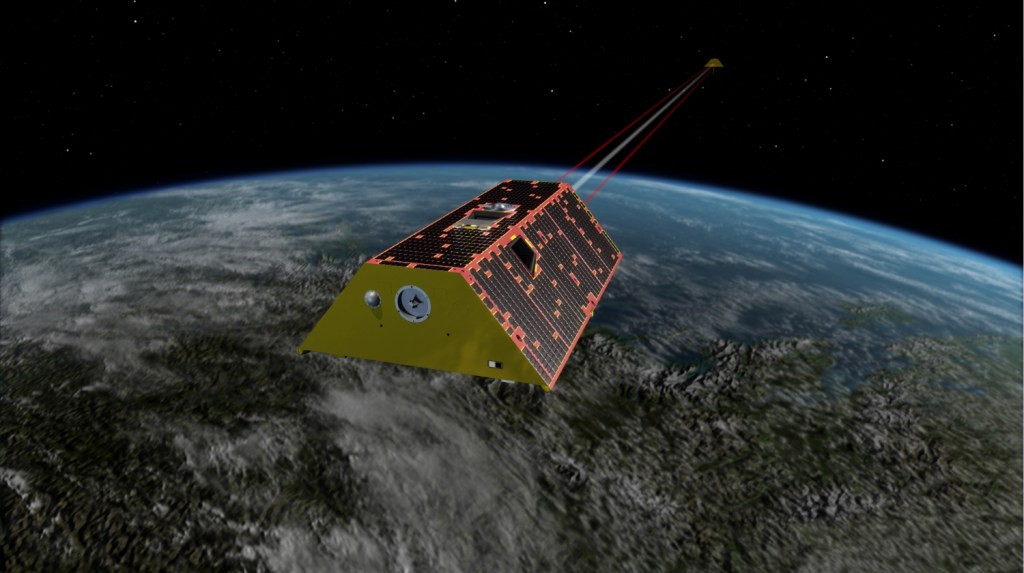
 |
| GRACE satellites measure changes in Earth’s gravity as they orbit, revealing shifting water levels across the planet (artist’s concept). |
An international team of scientists has found that Earth’s total amount of freshwater dropped sharply beginning in May 2014 and has remained at lower levels ever since, a significant change that could signal a shift toward a persistently drier phase for the planet’s continents. The findings, published in *Surveys in Geophysics*, were based on data from NASA-German satellites and suggest the planet may be entering a new era of water scarcity.
From 2015 through 2023, satellite measurements revealed that the global freshwater stored on land — encompassing both surface water (such as lakes and rivers) and groundwater — was approximately 290 cubic miles (1,200 cubic km) below the levels observed from 2002 to 2014. Matthew Rodell, a hydrologist at NASA’s Goddard Space Flight Center and co-author of the study, compared this loss to “two and a half times the volume of Lake Erie,” highlighting the scale of the reduction.
The global freshwater decline is particularly concerning as drought conditions and the increasing expansion of irrigated agriculture force cities and farms to rely more heavily on groundwater. This dependence can trigger a vicious cycle: groundwater supplies are depleted, precipitation fails to replenish reserves, and additional water is extracted, further exacerbating the problem. The UN’s 2024 water stress report underscores the risks of such shortages, including the potential for famine, conflicts, poverty, and health crises as people turn to contaminated water sources.
The research team identified the global freshwater decline using data from the Gravity Recovery and Climate Experiment (GRACE) satellites. These satellites, operated by the German Aerospace Center, German Research Centre for Geosciences, and NASA, track fluctuations in Earth’s gravity, which are linked to changes in water mass on land and underground. The original GRACE satellites operated from 2002 to 2017, and the follow-up GRACE–Follow On (GRACE–FO) satellites have been in operation since 2018.
The decline began with a severe drought in northern and central Brazil in 2014 and was followed by droughts in regions across Australasia, South America, North America, Europe, and Africa. A major El Niño event in 2015–2016, driven by warmer ocean temperatures in the tropical Pacific, played a role in altering weather patterns worldwide. Despite the subsiding of El Niño, however, freshwater levels have not rebounded, and in fact, 13 of the world’s 30 most intense droughts, as observed by GRACE, have occurred since 2015.
The researchers suspect that global warming may be contributing to the continued freshwater depletion. Warming temperatures increase the atmosphere’s capacity to hold water vapor, leading to more extreme weather patterns, including intense precipitation events that don’t effectively replenish groundwater. As NASA Goddard meteorologist Michael Bosilovich explained, while overall rainfall may not change dramatically, the long dry spells between heavy rains leave soil drier and less able to absorb water. “The problem when you have extreme precipitation is the water ends up running off, instead of soaking in,” he said.
This ongoing trend suggests that the water cycle is becoming less effective at replenishing global freshwater reserves. As Bosilovich noted, the warming atmosphere not only enhances evaporation but also amplifies the frequency and intensity of droughts.
Despite the compelling evidence linking global warming to the freshwater decline, experts like Susanna Werth, a hydrologist at Virginia Tech who was not involved in the study, caution that definitive conclusions are difficult to draw. “There are uncertainties in climate predictions,” Werth said, acknowledging that both measurements and models have inherent errors.
Whether Earth’s freshwater levels will recover to pre-2015 levels, stabilize at their current reduced state, or continue to decline remains uncertain. However, given that the nine warmest years on record coincide with the observed drop in freshwater, Rodell expressed concern that this may be a signal of things to come.We don’t think this is a coincidence,” he said, “and it could be a harbinger of what’s to come.

